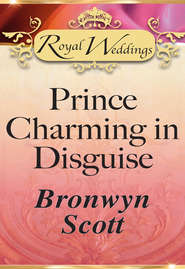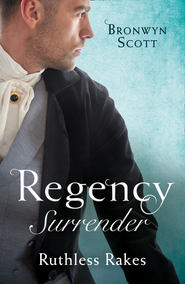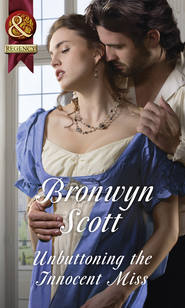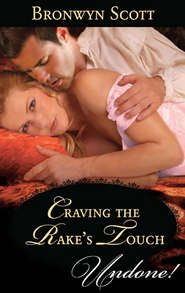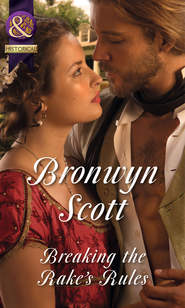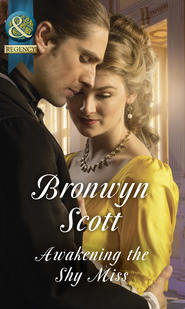По всем вопросам обращайтесь на: info@litportal.ru
(©) 2003-2024.
✖
A Marriage Deal With The Viscount
Автор
Год написания книги
2019
Настройки чтения
Размер шрифта
Высота строк
Поля
Il Marchese would have to find her first. Money meant she could fight. It also meant she could run. Money was portable. She would go to ground in the most obscure parts of England if need be. The trip to Somerset was a start. Would the Marchese give her fair warning? Would he come himself or would he send his minions to negotiate?
No. She wasn’t going to think about it. She would not worry over it. He wanted her to worry. This letter was the beginning of the torment he’d designed for her, part of his game, lest she forget who really held all the power. She entered the house, her head high, a smile on her face. Helena must not know about this new threat. Helena would want to fix everything, would want to use her father-in-law’s influence to protect her without realising the consequences of stirring that pot. Sofia could not allow her friend to be dragged down into the mire of her life. She’d not told Helena everything, could hardly bring herself to give words to her marriage, not when Helena’s was so blissful.
This was her battle and she’d wage it alone as she’d waged so many other campaigns in her life. Alone, victory was possible, escape was possible, freedom was possible. With others involved, there could only be...complications. In two days, she could leave London behind her and vanish into the west. Like a good general, she would retreat, regroup and fortify her new position. There was only the wedding to get through and then the ball. She’d survived worse.
Chapter Three (#u989b1a48-84ae-57a0-bd13-0548bd470d02)
Conall shifted uncomfortably on the hard seat of the pew. He’d survived worse, but there was no doubt weddings made him edgy. They were reminders of the passage of time and the pressing need to do his duty for the Viscountcy; a duty he could not afford without a wealthy bride, which placed him in a rather contradictory position. To marry money, one needed to have money. Unless one wanted to marry a wealthy Cit. No woman of good birth wanted to marry an impoverished title. Olivia de Pugh had reminded him quite coldly of that axiom when she’d broken off their pending betrothal right after his father’s death when Conall had gone to her in good faith with the financial details his death had revealed. She had not been impressed with his honesty.
Weddings were also reminders that marriage was the greatest business risk of all, one that came with no safety net, as his mother had discovered. Her lifetime of security had been an illusion maintained only as long as his father had lived. Even his death proved that forever was for ever—the choices made in that marriage would follow his mother always. When it came to matrimony, there was no getting out of it, there was only tolerating it.
Conall took his seat five rows back from the Cowden family pew and looked around St George’s. There were plenty of people here who were doing just that—tolerating it. Behind him sat Lord and Lady Fairchild, who both gambled copiously, but never together, perhaps to recoup the excitement their marriage lacked; to his left was Lord Duchaine, who had come alone as he usually did. Lady Duchaine was in Paris, staying longer with each annual trip to the Continent. There were rumours she kept a lover in a grand apartment in the Faubourg, a lover ardent enough to override the pleasures of the London Season.
There were others, too. All decked out in high fashion, all with false smiles and similar stories. Duchaine and the Fairchilds were by no means anomalies. How ironic they’d all come to celebrate another couple being consigned to their ranks. Conall thought it more appropriate if they’d come to mourn or at least warn the couple. It seemed hypocritical for the noble masses that filled St. George’s to smile and shed a ‘happy tear’ when they knew from experience just how elusive marital happiness was.
Across the aisle, Olivia de Pugh, golden and lovely in a pale-yellow gown specked with tiny primrose flowers, entered with her family and the very wealthy Baron Crossfield. She spied Conall and gave the slightest of nods and an I-told-you-so smile. Another time, he might have felt the intended sting of her gesture, but today, Olivia’s traditional English beauty left him empty. Perhaps he’d had a narrow escape, after all. What man wanted to be loved for his income or title alone? Wasn’t this room full of people who were testament to how unsatisfying that premise ultimately was? And yet the practice of matching title to fortune persisted as if by doing it over and over again, it would suddenly come out aright.
Or maybe the room was full of people, like him, who’d once hoped they’d be different, that for them, marriage might work out. After all, it had worked out for the Treshams. That family was renowned for their love matches. Conall focused his gaze on the Cowden pew, where there sat two generations of exceptions. The Duke and Duchess of Cowden were already in place, hands linked, heads bent towards one another. Beside them sat their two daughters-in-law—Helena valiantly hiding a six-month pregnancy beneath crinolines to avoid censure and Fortis’s wife, Avaline, her blonde head held high against gossip about her absent husband. Conall made a note to speak with her at the wedding breakfast, to offer her the consolation of his presence. At the front of the church, Ferris Tresham waited for his bride, his older brother at his shoulder in fraternal solidarity. Ferris’s eyes were riveted on the back doors, but Frederick’s gaze was for Helena. Anyone could see that after seven years of marriage, he was still mad for his wife.
Once upon a time, that had been Conall’s dream, too—a love match with a woman who inspired such loyalty and affection in him. His father’s death had changed all that. His hopes for a marriage were different now. These days, a good marriage was defined for him as one that would secure his mother’s future, his sister’s dowry and his younger brother’s education, along with the upkeep of the estate. He would gladly set aside his personal affections to achieve those things which his father had failed to guarantee. That failure tainted his grief, mixing anger with an overwhelming sense of loss when he thought of his father.
Around Conall, people began to shift in their seats, heads craning to the back doors. Murmurs escalated to barely suppressed whispers. Time to start? Conall turned in his seat to catch sight of the bride and the signal to stand, but there was no one. ‘False alarm, eh?’ He elbowed his friend, Lord Hargreaves, good-naturedly.
Hargreaves, blond and young, with a nose for gossip, arched his eyebrow. ‘Hardly a false alarm, old chap.’ He lifted his chin with a discreet jerk to indicate the back rows of the church where a woman sat, square-shouldered, and dressed in lavender. Conall chuckled at that—lavender was a colour for half-mourning. Perhaps someone else understood weddings as he did. The woman’s face was veiled by a fetching lavender creation atop spun-gold hair, but it could not entirely obscure her identity.
She was not the sort of woman a man forgot.
Even veiled, there was an allure to her. She could not hide in a crowd even if she wanted to and apparently today she wanted to. The veil was doing La Marchesa di Cremona no favours. If anything, the mystery it created made her even more conspicuous. Some people were just made to stand out.
‘I wouldn’t have thought she’d dare it,’ Hargreaves went on. ‘Then again, she’s dared so much already, one wonders if another dare matters.’ Hargreaves narrowed his gaze in mild disgust. ‘Lady Brixton’s affections tolerate much. Although I wonder if Lady Brixton actually thought she would come?’
La Marchesa chose that moment to lift her veil and settle it atop her hat, revealing the refined alabaster features of her face. In her eyes was a quiet fire that challenged the guests to look their fill. She sat still, the very rigidity of her posture a defence against the murmurs flying behind fans. Hargreaves leaned close with a whisper. ‘It was all around White’s yesterday that she refused Wenderly’s offer of carte blanche. Slapped him for it, in fact.’
Conall stiffened at the callous treatment of her reputation, not caring for the way Hargreaves dissected her, although he’d be hard pressed to explain why. ‘Is there a reason she should have accepted? Wenderly’s over fifty, nearly old enough to be her father.’ It wasn’t just the age. Wenderly had peculiar tastes. The thought of her with such a man put a cold pit in Conall’s stomach. He told himself the compulsion to defend La Marchesa was for Helena’s sake.
Hargreaves raised an eyebrow. ‘One wonders what she has to live on if she refuses men like Wenderly out of hand.’ The implication was crassly clear. A woman alone required a protector. ‘Her refusal cost Wenderly the loss of several hundred pounds and his pride at the betting book. Everyone is speculating about who she’s angling for if she feels she can disregard such a generous offer. Wenderly’s pockets are deep. He’d have kept her in jewels and gowns. She’d be striking on his arm, with her height and her hair colouring,’ Hargreaves hypothesised with shrewd calculation. ‘She could have been set for some time.’
Ah, so that was the root of Cowden’s remark about honourable recourse for supporting herself. Cowden feared without the outlet for business investments, La Marchesa might be ‘inclined’ to take a less honourable offer of support. What else remained for an Englishwoman who’d been away so long she’d become something of a foreigner to her own people?
The realisation that other men coveted her, that they reacted to her in the most carnal of ways, sat poorly with Conall. He told himself it was for business reasons. If she chose to invest with him, his family would be linked with her. Perhaps he should consider if there was truth to the rumours before rushing to champion her simply on Cowden’s hesitant word. He’d spent less than an hour in her company. What did he know of her tastes and associations? Perhaps she was deserving of the speculations being whispered around him. And yet his conscience whispered another message: perhaps she was not. Simply because her husband was not with her shouldn’t make her a target of vicious gossip. But he knew better. A woman alone who also had the audacity to be beautiful could not escape notice or censure. She was a creature who defied the natural laws of society.
He’d been out in society long enough to know he shouldn’t be surprised by the stir she caused. La Marchesa had an incomparable elegance and maintained a freshness about her that made a man want to stare, want to imagine tracing his finger along the delicate line of her jaw, across the pink of those lips, down the slim column of her neck to the discreet décolletage of her lavender gown. She certainly didn’t dress like the demi-monde. Her gown today was all that was proper, as was everything about her: her posture, her tasteful, quiet jewellery. Without the whispers, she might have been any gentleman’s wife.
How many other gentlemen were sitting here nursing the same idea? Could she be theirs? Conall’s own speculations stirred to life. He gave a deprecating chuckle at the direction of his thoughts. He was lowering himself to society’s level with such base thoughts. Why did the presence or absence of a man at a woman’s side define her? It was a thought worthy of his sister, Cecilia, who believed herself to be a grand proponent of liberated womanhood.
La Marchesa lifted a hand to play with the pearl necklace that lay at the base of her throat, the only sign that she was uncomfortable in her surroundings, or that she might possibly be privy to the things whispered about her.
Hargreaves tilted his head in frank appraisal. ‘She’s a beauty and now, with her European seasoning, she’ll bring a delicious je ne sais quoi to a sophisticated man’s bed.’ The last did it. Conall rose. He would not sit there and be party to sordid gossip about a woman who had no opportunity to defend herself against rumours, deserved or not. A woman, without a man to defend her, had no recourse and this was the result. She made herself an easy target for society’s sharp arrows.
‘Where are you going, Taunton?’ Hargreaves looked aggrieved at his departure, then caught the trajectory of his gaze. ‘Oh, you think to try your luck?’ He chuckled knowingly. ‘Be careful. Wenderly isn’t the first to fail. I hear she’s a man-eater, like one of those flowers that lure insects and then shuts its petals around its victim. Not that I’d mind having those petals wrapped around me and squeezing hard, if you know what I mean.’
Conall swallowed, his words terse. ‘I do know exactly what you mean. If you’ll excuse me?’ He made his way back up the aisle and slid into the empty space beside her, just as the doors of St George’s opened and the bride sailed forth on her father’s arm, white, pure and unsullied, drawing attention away from the Marchesa.
‘What are you doing?’ La Marchesa whispered as the crowd surged to their feet in a loud rustle of clothing.
Conall smiled. ‘Weddings are best enjoyed with a friend and you seemed in need of one.’
‘Thank you, but for the record, I was perfectly fine on my own.’ She smiled back, the briefest of expressions. ‘I hope you don’t regret it. Rumour has it I’m a dangerous woman to know.’ Then in quiet undertones, she added, ‘Don’t think for a moment this will help you get your money. You can’t flatter or flirt your way into my finances.’
Conall kept his gaze straight ahead, politely fixed on the bride’s progression. ‘It never crossed my mind.’ It truly hadn’t. He’d looked to the back and seen the determined expression in her eyes. That had been enough. She was a warrior among foes here. For reasons he couldn’t fathom, and didn’t want to fathom, he hadn’t wanted her to be alone. For all the strength and sharpness she’d exhibited, there was vulnerability in her, too.
Perhaps it was his fascination with that vulnerability, with her mystery, that had prodded him to the back. Perhaps it was sheer chivalry that demanded he stand up for the Treshams, who’d taken her in, or maybe it was simply because he knew what it was like to be alone in a room full of people. There’d been numerous occasions after his father had died when people hadn’t known what to say, or how to say it, so they’d said nothing, but gone about their conversations with others, talking about him, not to him, just as they were doing to her today. No one acknowledged the Marchesa directly. Even in the crowded church, the spot beside her had remained pointedly empty. But everyone knew she was here and everyone had decided it was best to treat her as if she were invisible or inanimate, a thing that couldn’t be hurt by their darts. All except for him.
Sofia worried the hem of her handkerchief with fingers hidden in the folds of her skirts. She’d be damned if she’d let anyone see how the wedding discomfited her. She’d provided them enough sport for the day simply by being there—something she was regretting in hindsight. It was true: weddings always made you remember your own. Her own was something Sofia would rather forget. As a result, she did not enjoy the marital celebration. Specifically, she did not enjoy the way it made her feel.
The bride passed, radiant and innocent in white, and Sofia’s stomach clenched. She’d been radiant and innocent once. Her own wedding had been much like this: pews filled with people, flowers and ribbon festooning the aisles and the candelabra, a dress with yards of satin and lace, and a blushing bride beneath the sheer tulle of her veil. She’d been as eager as this girl for the adventure of marriage.
The adventure had not gone well. It should have, and that it hadn’t had been a surprise. Her husband was handsome, wealthy, well-travelled and titled. He lived in a grand villa in Piedmont, had expansive apartments in Turin, the capital of the Piedmont kingdom, a lodge in the Dolomites, a summer palace, and had showered his bride with enough jewels to turn a young girl’s head. He spent his summers at the villa on Sardinia, his winters gambling in Nice or in Venice amid the festival of Carnevale. For a girl fresh out of finishing school, it had been a fairy-tale come to life. She should have looked closer. She should have refused. Her parents should have refused. They should have known better when she did not. They had of course known, that was the rub. They simply hadn’t cared. They’d needed the money badly enough to forgo looking beneath the Marchese’s glamour.
She was wiser now. When something looked too good to be true, it probably was. Even this attractive man, who stood next to her thinking his station beside her would put a stop to wagging tongues, was likely riddled with secrets. How like a man to believe his presence was all that was required to make a woman decent. Did he ever stop to think his presence might have made things worse?
She’d hoped to be inconspicuous today with a veil of her own lending anonymity, but it had done just the opposite. Neither had her bid for discretion been helped along by the man beside her. It was hard to hide when one was seated by the handsomest man in the room. Every woman’s eyes in the church had followed his progress back up the aisle to the empty seat beside her and the whispers had started again.
Sofia slid Taunton a covert look. Did he realise his efforts had only made her more obvious? Had only intensified the talk about her? His gesture had likely only served to link him to the chain of sordid speculations made about her. She’d bet the contents of her reticule the guests behind them were thinking he’d come to try his luck in winning her intimate attentions much as Wenderly had. Maybe he had. Perhaps he thought his looks would stand him in better stead than Wenderly. Perhaps he even thought to woo the money out of her.
His efforts might have worked on another woman. As for her, she had no intentions of making the same mistake twice. A man needed more to recommend himself than his good looks. If that was behind his reasoning in coming to her side, he would be disappointed in the results. She wouldn’t thank Cowden for it, if he turned out to be the same as other men. She employed the guise of Barnham for precisely that sort of protection when it came to business dealings and she’d trusted Cowden to vet this family friend of his before revealing her situation.
The bride reached the front of the church and everyone took their seats. The service began and Sofia pushed away the rituals and the memories as best she could with thoughts of the upcoming enterprise. If Taunton was right about alpaca wool being as lucrative as his research indicated, she could double her profits, eventually. However, funding the loan for his mill came with a certain amount of risk. Mills were far more expensive than a cargo of silks. The mill loan required focusing a large portion of her funds on a single venture instead of spreading them out among several as she preferred. Diversifying was a much safer investment strategy in case one of the deals didn’t turn out; loans were also paid back slowly, over time. There was little help for her in that.
In the background of the wedding, she was mildly aware of Ferris Tresham’s voice affirming his vows, ‘For richer or poorer...’ A loan certainly was the poorer of the investments. She wasn’t looking to make a loan. She was looking to make money. She had her own causes to pursue, her own dreams about making the world more equitable for women and children, those who had no voice. She’d often thought of building a mill town herself where that could be possible. But she was years from such a goal. Why buy her own mill, why wait until she had funds to do it on her own, when she could do it through the Viscount? She could build her mill town through his mill, through his alpaca-wool industry in exchange for funding his venture. But before that she had to make sure, first hand, the venture was sound. There was no sense in investing in a mill that created a product for which there was no market.
The Dream, as she liked to call it, kept her busy right up to the kiss. Her stomach slowly started to unclench as the bridal couple passed by on their way out of the church. Sofia drew a deep breath. She’d survived, but not unscathed. ‘Are you well?’ Taunton solicited, offering his steady right arm as the guests began to exit. She needed that firm arm more today than she had yesterday. She hated needing it, hated relying on him, a virtual stranger who’d decided to play the hero. Today she was prepared for him, but that didn’t stop the warm strength of him from travelling through her again at his touch.
‘You’re pale.’ There were questions in his grey eyes when he looked at her with concern. But she didn’t want to answer questions today.
‘I’m quite fine. Just a bit tired.’ She lowered her veil as if the fabric could hold the questions at bay a little longer. There would be a consequence for not answering them, though. In her absence, others would respond in her stead with their own speculations. How long would it be before Taunton heard the rumours, before he wanted to know who she was?
Out of doors in the bright sunshine, she released his arm. ‘If you will excuse me, I think I will forgo the wedding breakfast. I’ve a bit of a headache. Will you give my regards to Helena and to the bride and groom?’ She moved into the crowd of guests before he could protest. She had her reprieve—until the next time. And there would be a next time. There was the honeymooners’ ball to get through and, heaven help her, the four-hour train ride to Taunton where they’d have hours with nothing to entertain themselves except each other and her past.
Chapter Four (#u989b1a48-84ae-57a0-bd13-0548bd470d02)
He would get her back even if he had to cross the Channel to do it. He hoped it wouldn’t come to that. He didn’t much care for England. Giancarlo Bianchi, Marchese di Cremona, surveyed the view of Piazza San Carlo from his palazzo window; the famous statue of Emanuele Filiberto on horseback, flanked by coffeehouses and aristocratic palazzos like his own, was a far cry from the stolid square town houses of London. What a filthy city London was with its soot and litter in the streets. For all its innovations, London could be improved. It couldn’t hold a candle to his city, to Turin, the centre of the Risorgimento, with its fine universities, scholars, artists and musicians.
He brushed at the sleeve of his coat as if removing a fine sheen of street dirt. He’d not set foot on English soil since he’d claimed his bride thirteen years ago. God willing, he wouldn’t have to go back. Andelmo, his most trusted minion, would bring her to him. His wife was proving to be more problematic than he’d originally anticipated, a concept that both irritated and aroused him.
His valet entered his suite with the trunks containing his new spring wardrobe, his secretary following close behind. It was time for the morning reports although it was well after noon. Giancarlo motioned for his secretary to join him at the desk in the window bay. ‘What news do you have? Is there any word from London?’
The secretary handed him a telegram. ‘There has been no sighting. The house remains empty, as it has since your man’s arrival.’






